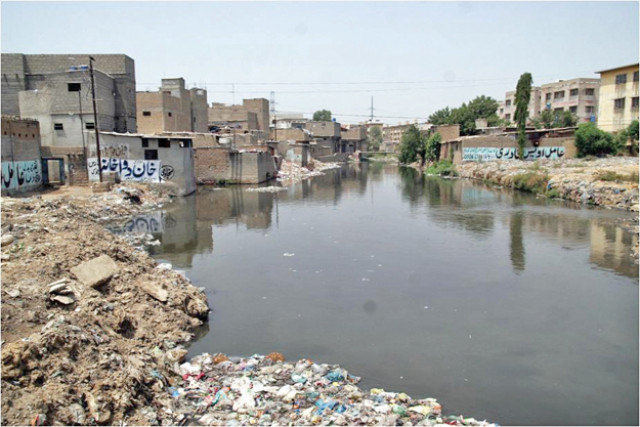Capital’s streams turned into fetid drains
Growing population, massive constructions in catchment areas continue to pollute streams

Islamabad’s natural streams flowing out of seasonal springs of the Margalla Hills have turned into filthy and stinky drains as city managers have failed to put in place a proper waste disposal mechanism.
Rapid growth in population and massive construction in catchment areas continued to pollute streams emanating unpleasant odour throughout the city, besides turning brooks into a breeding ground for mosquitoes. The capital is home to about 26 small and large streams, passing through the hill torrents embracing rainwater and tossing over different residential sectors finally converging into two main streams outside Islamabad. Due to the discharge of domestic waste and leakage of municipal sewers, these streams are highly polluted and spew foul odours and breed mosquitoes said an official of the Pakistan Environment Protection Agency (Pak-EPA).
“This is a continuous threat to capital’s environment, habitat and human health. Therefore, there is a dire need to focus on this dilemma,” the official said. In the initial master plan of Islamabad, the natural streams were left open with large spaces on both sides to make them flow smoothly along with their natural courses. Later, they were narrowed to create space for residential and commercial plots.
Overflowing choked sewerage lines and plastic waste dumping into nullahs are all palpable as the Capital Development Authority (CDA) and the Metropolitan Corporation Islamabad (MCI) have failed to fulfil their responsibilities.
“On the one hand, citizens show negligence in keeping these tributaries clean and on the other hand, the city managers have also failed to put in place a proper waste disposal system,” said a CDA official.
“If you observe the tributaries of these drains, they are crystal clear, but they become dirty and smelly when they pass through human settlements,” the official said on condition of anonymity. At some spots, sewage flows directly into natural streams. It becomes worse at night, he added.
“Initially, rainwater and sewage drains were laid separately, but, later completion certificates were issued for house owners, which encouraged people and they stopped laying separate lines for sewage and rainwater to save on the cost of pipelines and started discharging sewage into rain drains,” the official said.
Only one sewage treatment plant (STP) functional in Sector I-9 treats up to six million gallons of sewage per day (mgd) against its total capacity of 14 mgd due to a broken network of sewage supply lines in various sectors. If run at full capacity, this plant can provide an ample amount of water for horticulture in the capital.
CDA Deputy Director General Water Sardar Khan Zimri said funds have been allocated for improving the network of trunk lines for the smooth flow of sewage to the STP. “Once the broken lines are repaired, we will receive almost 10-12mgd of sewage for treatment.”
There are also reports that in the absence of STPs, untreated water from localities in the catchment areas was mixing with water coming to Rawal Dam, exposing residents of the twin cities to serious health hazards.
The Supreme Court in a suo motu notice on water contamination had directed the installation of STPs. Although, the civic agency in light of this order announced to establishment STPs in catchment areas such as Shahdara, Bari Imam and Banigala but this Rs3.9 billion project could not take off for the last several years due to one reason or the other. When this project starts, it will require 14 months to complete and be able to treat 9.6 million gallons of untreated water daily.
According to the CDA, a PC-I was prepared and after, awarding the tender, the civic body approached for a revised PC-I. The Pak-EPA objected that the environmental impact assessment (EIA) for the project was not carried out. Meantime, the bid’s validity period expired. Now the civic agency has approached the Planning Commission seeking guidance as to how to move forward with the project.
The CDA has informed the Planning Commission that EIA could not be conducted for a project being carried out through the EPC mode. The CDA has also proposed to the Planning Commission to allow project execution without the EPC mode so the civic body could get the environmental assessment impact conducted before the contract was awarded.
Meanwhile, keeping in view the worsening situation, the government has earmarked Rs200 million in the annual budget for the year 2022-23 for the establishment of Korang River and Rawal lake water treatment plants.
Published in The Express Tribune, June 20th, 2022.



















COMMENTS
Comments are moderated and generally will be posted if they are on-topic and not abusive.
For more information, please see our Comments FAQ